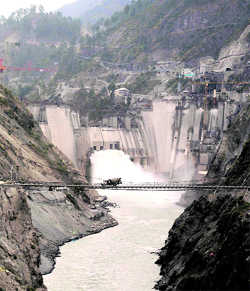
No abrogation, but India to test Indus treaty waters
Tribune News Service
New Delhi, September 26
India today took the bold decision to fully utilise the potential of the three western rivers as per the Indus Waters Treaty (IWT), in an attempt to increase the pressure on Pakistan after the Uri attack.
India’s decision stops short of “abrogation” of the treaty and aims at playing within the legal limits. The decision is set to rattle Pakistan and the world, too.
Prime Minister Narendra Modi chaired a meeting today to review the IWT. According to sources, Modi said, “Blood and water can’t flow at the same time.”
The meeting was attended by Principal Secretary to PM Nripendra Misra, National Security Adviser Ajit Doval, Foreign Secretary S Jaishankar, the Water Resources Secretary and other senior officials. The treaty was reviewed and it was decided that India would exploit to the fullest capacity the three Pak-controlled rivers — Indus, Chenab and Jhelum — as per the Indus Waters Treaty. In addition, a decision has also been taken to review the construction on the Tulbul navigation project, which has been suspended since 2007.
Sources said it was felt at the meeting that the IWT wasn’t fair to the people of Jammu and Kashmir, but its fuller implementation would benefit them. Sources add the government’s plan was to exploit an option that hadn’t been exercised in the past 30 years — to use the western rivers to benefit farmers of Jammu and Kashmir.
Jammu and Kashmir Deputy Chief Minister Nirmal Singh last week said the state government would support whatever decision the Centre took on the IWT.
The historic treaty signed in 1960 has stood the test of time so far, despite the wars fought between the two nations.
Apex court’s no to PIL
- New Delhi: An SC Bench on Monday rejected a plea for an urgent hearing on declaring as null and void the Indus Waters Treaty signed by India and Pakistan in 1960. Petitioner ML Sharma said the treaty was invalid as it should have been signed by the President instead of Prime Minister Jawaharlal Nehru. There was no hurry in hearing the plea as the treaty was 56 years old, the CJI said. tns
